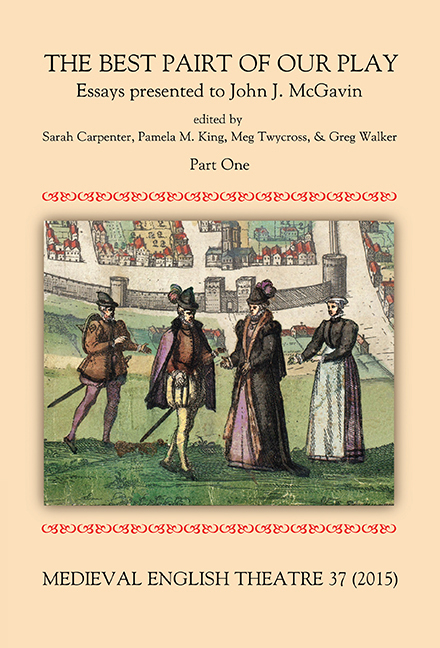Book contents
- Frontmatter
- Contents
- Epigraph
- Editorial
- In honorem John J. McGavin
- John J. McGavin: Bibliography
- The Places of Foolery: Robert Armin and fooling in Edinburgh
- George Bannatyne's ‘Sertane Mirry Interludis’, and Sir David Lyndsay's play
- The Linlithgow Interlude of 1540 and Lyndsay's Satire of the Thrie Estaitis
- Stage Directions in Lyndsay's Ane Satire of the Thrie Estaits
- The Dramatic Voice of William Dunbar
- How to Track a Bear in Southwark: a learning module
- The Digby Mary Magdalen in Performance: a merry peripeteia
- ‘Thus am I Rent on Rode’: taking apart the Towneley Crucifixion
- The Second Shepherds' Play: a play for the Christmas season
- ‘They did not come out of an Abbey in Lancashire’: Francis Douce and the manuscript of the Towneley Plays
- EDITORIAL BOARD (2015)
In honorem John J. McGavin
Published online by Cambridge University Press: 05 March 2016
- Frontmatter
- Contents
- Epigraph
- Editorial
- In honorem John J. McGavin
- John J. McGavin: Bibliography
- The Places of Foolery: Robert Armin and fooling in Edinburgh
- George Bannatyne's ‘Sertane Mirry Interludis’, and Sir David Lyndsay's play
- The Linlithgow Interlude of 1540 and Lyndsay's Satire of the Thrie Estaitis
- Stage Directions in Lyndsay's Ane Satire of the Thrie Estaits
- The Dramatic Voice of William Dunbar
- How to Track a Bear in Southwark: a learning module
- The Digby Mary Magdalen in Performance: a merry peripeteia
- ‘Thus am I Rent on Rode’: taking apart the Towneley Crucifixion
- The Second Shepherds' Play: a play for the Christmas season
- ‘They did not come out of an Abbey in Lancashire’: Francis Douce and the manuscript of the Towneley Plays
- EDITORIAL BOARD (2015)
Summary
Volumes 37 and 38 of Medieval English Theatre offer a collection of essays to honour John McGavin. Written by his friends and colleagues, students and admirers, these all testify to the deep affection as well as the academic esteem in which John himself and his work across the discipline of early theatre are held. Many reflect his own particular interests in the early drama of England and, especially, of Scotland: its records and narratives, its spectators, its intellectual and affective strategies, and its cultural work. There are papers on many aspects of Scottish theatrical culture, from ceremonial (Williamson) to Sir David Lyndsay (Hadley Williams, Happé, and Walker); from foolery (Carpenter) to Dunbar's dramatic voice (Jack). John's abiding interest in spectatorship and audience reception is approached from different angles, in morality drama (Steenbrugge), dialogue (Bose), in the York Play (King), academic drama (Dutton), and theory (van Pelt). His authoritative work in the creative interpretation of records and narratives, of both dramatic and para-dramatic performance, is reflected in essays on coronation ceremony (Hunt), libel (Egan), and monastic crucifixion games (Klausner). His steering role in the project on Early Modern London Theatres is commemorated in the online Bear Hunt (MacLean and Hagen). Three essays engage with one of the central current concerns of early theatre study, the Towneley manuscript and its plays (Epp, Johnston, and Twycross), while two more address uniquely revealing single plays: the Digby Mary Magdalen (Godfrey), and the Welsh Troelus a Chresyd (Niebrzydowski).
John's work has indeed come to epitomise ‘the best pairt of our play’. The number of essays contributed to the collection, by scholars young and old across the whole field of early drama studies, shows the range of his influence on the discipline itself and on generations of those working within it. This collection is offered as a tribute both to his creative scholarship and his collegiality. There is no space here for all the many friends and colleagues who would like to salute him on this occasion; but we hope that the recollections of three voices, offering memories and appreciation from John's student days to the present, may speak for us all.
- Type
- Chapter
- Information
- Medieval English Theatre 37The Best Pairt of our Play. Essays presented to John J. McGavin. Part I, pp. 3 - 8Publisher: Boydell & BrewerPrint publication year: 2015

